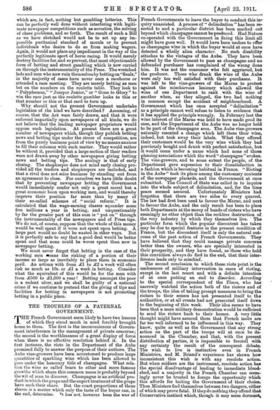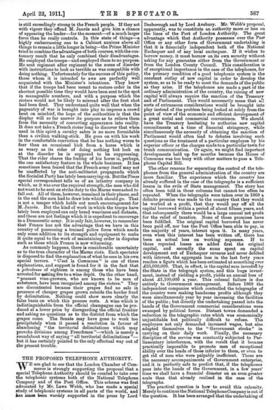THE TROUBLES OF A PATERNAL GOVERNMENT.
THE French Government seem likely to have two lessons of which they stand much in need forcibly brought home to them. The first is the inconveniences of Govern- ment interference in the management of private concerns; the second is the worthlessness of a great display of force when there is no effective resolution behind it. In the first instance, the riots in the Department of the Aube promised fully to answer the purpose of their authors. The Aube vine-growers have been accustomed to produce large quantities of sparkling wine which has been allowed to pass under the honorary title of champagne. What rela- tion the wine so called bears to other and more famous growths which share this common name is probably beyond the wit of man to discover. Champagne is an artificial pro- duct in which the grape and the expert treatment of the grape have each their share. But the exact proportions of these shares is a matter which only the taste of the buyer can, in the end, determine. it has not. however been the way of French Governments to leave the buyer to conduct this in- quiry unassisted. A process of " delimitation " has been re- sorted to and a particular district has been marked out beyond which champagne cannot be produced. Had Nature co-operated with the Government in fixing this limit all might have gone well. It would have been useless to offer as champagne wine in which the buyer would at once have detected a wholly alien character. No such disability attaches to the vintages of the Aube. They have been allowed by the Government to pass as champagne and no defrauded purchaser has complained of the wrong done him. It was not the consumer who felt aggrieved, but the producer. Those who drank the wine of the Aube were only too well satisfied with their purchases. It was left to the vine-growers of the Marne to protest against the mischievous leniency which allowed the wine of one Department to rank with the wine of another when, as they alleged, the two had nothing in common except the accident of neighbourhood. A Government which has once accepted " delimitation" as a principle cannot well refuse to listen to evidence that it has applied the principle wrongly. In February last the wine interest of the Marne was held to have made good its case, and the Department of the Aube was no longer held to be part of the champagne area. The Aube vine-growers naturally resented a change which left them their wine, indeed, but took away their labels. What they offered their customers would be the very wine which they had previously bought and drunk with perfect satisfaction, but it would come under a name which had none of those pleasing associations which the word " champagne " evokes. The vine-growers, and to some extent the people, of the Department gave expression to their dissatisfaction in a fashion which is becoming habitual in France. " Rioting in the Aube" took its place among the customary contents of the newspaper placards, and the Government at once submitted. The Council of State was called in to inquire into the whole subject of delimitation, and, for the time peace seemed assured. Unfortunately Ministers had forgotten that there are two sides to every quarrel. The law had first been used to favour the Marne, and next to favour the Aube, and the only result has been to place both Departments at the mercy of bands of rioters who have seemingly no other object than the reckless destruction of the very industry by which they themselves live. The particular form which the popular discontent has taken may be due to special features in the present condition of France, but the discontent itself is only the natural out- come of the past action of French Governments. They have believed that they could manage private concerns better than the owners, who are specially interested in their prosperity, and they have found, as those who hold this conviction always do find in the end, that their inter- ference leads only to mischief.
The second conclusion to which these riots point is the uselessness of military intervention in cases of rioting, except in the last resort and with a definite intention of at once putting an end to disorder. According to the special correspondent of the Times, who has narrowly watched the action both of the rioters and of the troops, the idea of taking prompt measures to bring the rioters to their senses has not presented itself to the authorities, or at all events had not presented itself down to the beginning of this week. Their idea seems to have been that a mere military demonstration would be sufficient to send the rioters back to their homes. A very little thought might have assured them that French mobs are far too well informed to be influenced in this way. They know, quite as well as the Government that any strong action on the part of the troops will at once be de- nounced in the Chamber, and that, with the present distribution of parties, it is impossible to foretell with any certainty the result of the consequent debate. The wish to live is instinctive even in French Ministries, and M. Briand's experience has shown how inconsistent this wish is with any resolute action. But when soldiers are the instrument, resolute action has the special disadvantage of leading to immediate blood- shed, and a majority in the French Chamber can seem- ingly never be trusted to forego the opportunity which this affords for baiting the Government of their choice. Thus Ministers find themselves between two dangers, either of which may prove fatal. If they do nothing they offend that Conservative instinct which, though it may seem dormant, is still exceedingly strong in the French people. If they act with vigour they offend M. Auras and give him a chance of appearing the leader—for the moment—of a much larger force than he really controls. In this state of things—a highly embarrassing one to a Cabinet anxious above all things to remain a little longer in being—the Prime Minister tried to combine the advantages of both courses, with the cus- tomary result that he only combined their disadvantages. He employed the troops—and employed them to no purpose. He sent regiment after regiment to the scene of disorder with instructions to look as terrible as was compatible with doing nothing. Unfortunately for the success of this policy, those whom it is intended to awe are perfectly well acquainted with the Minister's intentions. They know that if the troops had been meant to restore order in the shortest possible time they would have been sent to the spot in manageable numbers, and with a purpose which the rioters would not be likely to misread after the first shot had been fired. They understand quite well that when the pageantry of war is brought into play to impress a crowd bent on mischief, the hope of the authorities is that the display will so far answer its purpose as to relieve them from the necessity of converting appearance into reality. It does not take a French rioter long to discover that when used in this spirit a cavalry sabre is no more formidable than a civilian walking-stick. He goes on with his work in the comfortable conviction that he has nothing worse to fear than an occasional kick from a horse which is as weary as its rider of doing nothing but look on at the disorder he is supposed to be suppressing. That the rider shares the feeling of his horse is, perhaps, the one satisfactory feature in the whole business. It has sometimes been feared that the French army itself may not be unaffected by the anti-militarist propaganda which the Socialist Party has lately been carrying on. But the Times special correspondent tells us of an infantry company in which, as it was over the required strength, the men who did not want to be sent on strike duty to the Marne were asked to fall out. All of them, however, remained in their places, and in the end the men had to draw lots which should go. That is not a temper which holds out much encouragement for M. Jaures. But the kind of work in which the troops have lately been employed can only breed weariness and distaste, and these are not feelings which it is expedient to encourage in a Democratic army. It is only fair, however, to remember that France has not the advantage that we have in this country of possessing a trained police force which needs only some addition to its strength and equipment to make it quite equal to the work of maintaining order in disputes such as those which France is now witnessing. As commonly happens, there is considerable uncertainty as to the true character of the Marne riots. Each spectator is disposed to find the explanation of what he sees in his own special terrors. " C'est la Commune " is one of these explanations, and support is found for it in the fact that a petroleuse of eighteen is among those who have been arrested for setting fire to a wine depot. On the other hand, "peasant vine-growers, who are known to be men of substance, have been recognised among the rioters." They are discontented because their grapes find no sale in presence of cheaper grapes grown outside the border fixed by delimitation. Nothing could show more clearly the false basis on which this process rests. A wine which is indistinguishable from the official champagne can be pro- duced at a lower price by disregarding the official frontier and asking no questions as to the district from which the grapes come. The Senate may have gone to work too precipitately when it passed a resolution in favour of abandoning " the territorial delimitations which may provoke divisions among Frenchmen "—which is merely a roundabout way of saying " all territorial delimitations "- but it has certainly pointed to the only effectual way out of the present trouble.







































 Previous page
Previous page